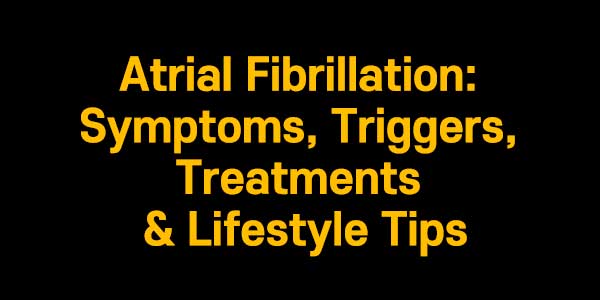
Ever feel like your heart is skipping a beat—or racing out of nowhere for no reason? 😰 That could be more than just stress. It might be *atrial fibrillation*—and it deserves your attention.
Hi friends! 👋 I wanted to open up about a topic that affects *millions* but doesn’t get talked about enough—atrial fibrillation, aka AFib. A close friend of mine was recently diagnosed, and it completely changed how I see heart health. From unexplained fatigue to sudden flutters in your chest, it can sneak up on anyone. So today, I'm breaking down AFib in the most friendly, no-fluff way possible. ❤️ Let's dive in and learn together—because knowledge really is power!
📋 Table of Contents
What is Atrial Fibrillation?
Atrial fibrillation (AFib) is a type of arrhythmia, or irregular heartbeat, where the upper chambers of your heart (the atria) beat chaotically and out of sync with the lower chambers (the ventricles). It’s like your heart’s rhythm has gone rogue. 🫀
While some people may feel absolutely nothing, others might notice heart palpitations, dizziness, fatigue, or shortness of breath. AFib can come and go—or stick around. Either way, it increases your risk of stroke, heart failure, and other complications. That’s why early detection is key!
Common Symptoms 😵
| Symptom | Details |
|---|---|
| Heart Palpitations | Fluttering, pounding, or rapid heartbeat that can feel scary or random |
| Fatigue | Feeling unusually tired even with little activity |
| Shortness of Breath | Especially during simple tasks like walking or climbing stairs |
| Dizziness or Lightheadedness | Can lead to fainting in severe cases |
Possible Causes & Triggers 🔍
AFib can be caused by a wide range of factors—and often, it’s a combo of several. Here are the most common:
- ✅ High blood pressure
- ✅ Heart disease (valve issues, past heart attacks)
- ✅ Overactive thyroid (hyperthyroidism)
- ✅ Excessive alcohol or caffeine intake
- ✅ Sleep apnea
- ✅ Stress, anxiety, or sudden emotional changes
Sometimes, AFib shows up with no clear trigger—this is called "lone AFib." That’s why it’s super important to monitor your heart health even if you feel “okay.”
Treatment Options 💊
Treating AFib is all about preventing stroke, controlling heart rate, and restoring a normal rhythm. Your doctor will decide the best plan based on your symptoms, age, and underlying health. Here are the most common approaches:
- 🩺 Blood thinners to prevent clots (e.g. warfarin, apixaban)
- ❤️ Beta-blockers or calcium channel blockers to slow heart rate
- ⚡ Cardioversion (electrical shock) to restore rhythm
- 🛠 Ablation therapy to destroy tissue causing the arrhythmia
- 💊 Antiarrhythmic meds to keep the heartbeat steady
Some folks manage it with medication alone, while others might need procedures. The key is to stay on top of it and work closely with your cardiologist. Don’t DIY this one, y’all. 🙏
Best & Worst Foods 🍽
What you eat plays a huge role in heart rhythm stability. Here’s a quick breakdown:
| Eat More | Avoid/Limit |
|---|---|
| Leafy greens, berries, fatty fish (like salmon), whole grains | Processed meats, fried foods, added sugars, excess caffeine |
| Magnesium-rich foods (avocados, nuts, seeds) | Alcohol (especially binge drinking!), high-sodium snacks |
Lifestyle Tips & Prevention 🧘
Here are simple, daily habits that can help manage or prevent AFib from acting up:
- 🧘 Practice stress management — deep breathing, meditation, or yoga
- 🚶 Get regular exercise — even a 30-minute walk can help
- 💧 Stay hydrated and limit alcohol
- 📉 Keep blood pressure and cholesterol in check
- 📵 Reduce caffeine and avoid energy drinks
- 😴 Sleep well — untreated sleep apnea is a hidden trigger!
❓ FAQ about Atrial Fibrillation
Is AFib life-threatening?
Not always immediately, but it raises your stroke risk significantly. With proper management, many live full lives.
Can AFib go away on its own?
Paroxysmal AFib sometimes stops by itself. But it can also become persistent without treatment.
How is AFib diagnosed?
Via ECG (electrocardiogram), Holter monitor, or wearable heart tracking devices like smartwatches.
Is caffeine safe with AFib?
It depends on the person. Some are sensitive to it, others aren’t. Best to monitor how it affects *your* heart.
Can exercise trigger AFib?
In rare cases, yes—especially intense endurance sports. But for most, moderate exercise is helpful.
Can I travel with AFib?
Absolutely! Just make sure to take meds on time, stay hydrated, and move around during long flights.
Thanks so much for staying with me till the end ❤️ I know heart stuff can feel overwhelming, but you’ve got this. Whether you’re managing AFib yourself or supporting someone who is, knowledge and community make all the difference. Have questions? Share your story in the comments — let’s talk, learn, and lift each other up 💬✨
atrial fibrillation, afib symptoms, irregular heartbeat, heart health, stroke prevention, blood thinners, palpitations, heart rhythm treatment, afib diet, lifestyle for heart